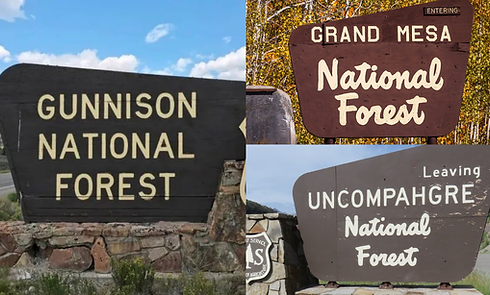Grand Mesa, Uncompahgre, and Gunnison National Forests

Planting in this forest.
The Grand Mesa, Uncompahgre, and Gunnison (GMUG) National Forests in Colorado, spanning over 3 million acres, are among the most ecologically diverse and breathtaking landscapes in the United States. From the towering Engelmann spruce and aspen forests to the rugged alpine meadows and sprawling watersheds, these forests are home to an incredible array of wildlife, including elk, mule deer, black bears, and the elusive Canada lynx. However, over the past two decades, the GMUG forests have faced a grave ecological challenge: the widespread devastation caused by the spruce bark beetle. This infestation has decimated nearly all Engelmann spruce trees across 500,000 acres, leaving once-vibrant forests barren and ecosystems in jeopardy.
In 2024, the GMUG National Forests embarked on the North Zone Planting project, one of the most ambitious restoration efforts to date. This initiative focused on planting 30,600 trees across beetle-affected areas to jumpstart recovery, enhance forest resilience, and restore critical habitats for wildlife. By carefully selecting and planting Engelmann spruce seedlings, the project aims to rebuild the ecological integrity of the forest while addressing long-term climate and biodiversity challenges.
The significance of this project lies not only in replanting trees but also in its ability to restore vital ecosystem functions. Forests play a critical role in maintaining watershed health, and the GMUG forests are no exception. Streams and rivers flowing from these forests provide drinking water to nearby communities and sustain habitats for aquatic species like trout. Reforestation efforts, such as the North Zone Planting, stabilize soil, reduce erosion, and ensure clean water supply—essential for both wildlife and humans.
The 2024 North Zone Planting builds upon a decade of dedicated restoration work in the GMUG forests. In 2019, the Sheep Flats Spruce Beetle Reforestation initiative planted nearly 150,000 Engelmann spruce trees on 420 acres in the Grand Valley Ranger District, stabilizing the Grove Creek watershed and improving habitats for species such as elk, deer, marten, and bears. The 2020 Spruce Bark Beetle Reforestation project expanded efforts, planting 140,000 trees on 834 acres of the Gunnison Ranger District, targeting areas hit hardest by the beetle infestation. In 2022, the Gunnison Spruce Beetle Tree Planting project reached new heights, with 154,640 trees planted, while the Grand Mesa Planting for Wind and Spruce Beetle Restoration introduced an additional 23,855 trees to support forest recovery.
These projects are not just about planting trees—they are about fostering resilience in an environment that has faced repeated and severe disturbances. For example, Engelmann spruce seedlings planted in these efforts are particularly vital as they support diverse wildlife, including the marten and Canada lynx, which rely on mature spruce forests for hunting and shelter. By reintroducing this keystone species, the projects aim to restore the delicate balance of these ecosystems.
Beyond ecological recovery, the GMUG forests hold cultural and recreational significance. The Grand Mesa, the world’s largest flat-top mountain, and the Gunnison River Basin draw visitors from around the globe. The forests offer thousands of miles of trails, rich biodiversity, and unique wildlife experiences, such as moose sightings on the Grand Mesa, where the population exceeds 120 individuals. These natural and cultural treasures underscore the importance of preserving the GMUG forests for future generations.
The 2024 North Zone Planting project exemplifies the ongoing commitment to restoring the GMUG forests. During the initial phases, forestry professionals and volunteers worked tirelessly to plant 30,600 Engelmann spruce seedlings in key areas. By the fall of 2024, the project had successfully established a foundation for forest regeneration, achieving a high seedling survival rate. This effort not only restores critical ecosystems but also ensures that the GMUG forests continue to thrive as a source of biodiversity, clean water, and natural beauty for years to come.




Location
Colorado, USA
Project Type
Reforestation
Environmental Benefits
Wildlife Habitat Support
Enhanced Biodiversity
Soil Stabilization and Erosion Control
Watershed Health Improvement
Climate Resilience and Carbon Sequestration
About this forest
The Grand Mesa, Uncompahgre, and Gunnison (GMUG) National Forests span over 3 million acres in Colorado, featuring diverse landscapes of towering spruce and aspen, alpine meadows, and vast watersheds. These forests support abundant wildlife, including elk, black bears, and the Canada lynx, while providing vital resources like clean water and recreation opportunities for nearby communities and visitors.




